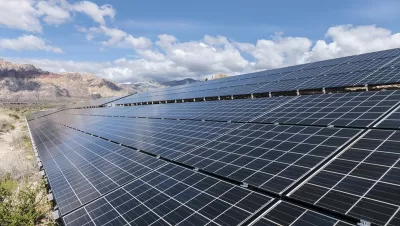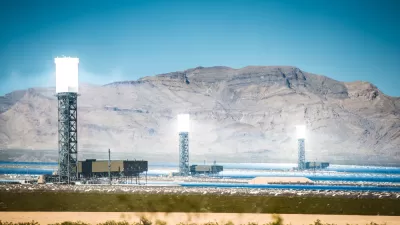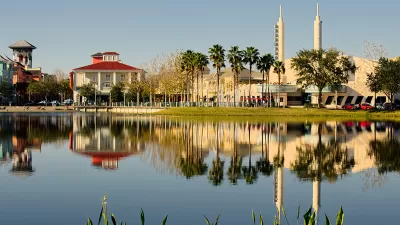Casinos are energy intensive and often located in areas with specific resource constraints and surpluses (i.e., Las Vegas), thus they offer a perfect case study for the future of solar energy.

Tovin Lapan offers an in-depth examination of the current state of electricity production in Las Vegas—where casinos and other consumers are looking for flexible options for producing solar energy.
The continued emergence of solar power, however, is "a growing predicament for power companies," according to Lapan. "While corporations are motivated to 'go green,' their push to be more energy efficient leaves the utility with less revenue to maintain the grid and can lead to rate increases. This can cause what energy market observers call the 'death spiral.'"
In Las Vegas, the state-regulated energy monopoly goes by the name NV Energy. With Las Vegas' large companies and surplus of sunshine, NV Energy is challenged by a constant pressure from companies seeking to generate energy on their own land, and on their own terms. "Confronted with increased use of solar power as the systems become more affordable, the company has moved to stabilize revenue," writes Lapan. "Earlier this year, NV Energy decreased the amount it pays residential owners of solar arrays for excess electricity they send into the grid, causing a public outcry."
One way state regulators have attempted to mitigate the impact of distributed solar is by charging an exit fee. The fee is designed to "stave off rate hikes for the remaining customers."
Companies like MGM and Wynn have already decided to pay the exit fee, with others planning to follow suit. Even the city of Las Vegas (located outside famous "Strip" that most people think of as the city) has set a goal to power all municipal buildings and public spaces with renewable energy by 2017. "It too must get PUC approval for its plan though," writes Lapan, "and the commission has mandated the city purchase the bulk of its electricity from one of NV Energy’s solar facilities."
FULL STORY: Why Some Las Vegas Casinos Are Gambling on Solar

Alabama: Trump Terminates Settlements for Black Communities Harmed By Raw Sewage
Trump deemed the landmark civil rights agreement “illegal DEI and environmental justice policy.”

Planetizen Federal Action Tracker
A weekly monitor of how Trump’s orders and actions are impacting planners and planning in America.

The 120 Year Old Tiny Home Villages That Sheltered San Francisco’s Earthquake Refugees
More than a century ago, San Francisco mobilized to house thousands of residents displaced by the 1906 earthquake. Could their strategy offer a model for the present?

In Both Crashes and Crime, Public Transportation is Far Safer than Driving
Contrary to popular assumptions, public transportation has far lower crash and crime rates than automobile travel. For safer communities, improve and encourage transit travel.

Report: Zoning Reforms Should Complement Nashville’s Ambitious Transit Plan
Without reform, restrictive zoning codes will limit the impact of the city’s planned transit expansion and could exclude some of the residents who depend on transit the most.

Judge Orders Release of Frozen IRA, IIJA Funding
The decision is a victory for environmental groups who charged that freezing funds for critical infrastructure and disaster response programs caused “real and irreparable harm” to communities.
Urban Design for Planners 1: Software Tools
This six-course series explores essential urban design concepts using open source software and equips planners with the tools they need to participate fully in the urban design process.
Planning for Universal Design
Learn the tools for implementing Universal Design in planning regulations.
Clanton & Associates, Inc.
Jessamine County Fiscal Court
Institute for Housing and Urban Development Studies (IHS)
City of Grandview
Harvard GSD Executive Education
Toledo-Lucas County Plan Commissions
Salt Lake City
NYU Wagner Graduate School of Public Service




























